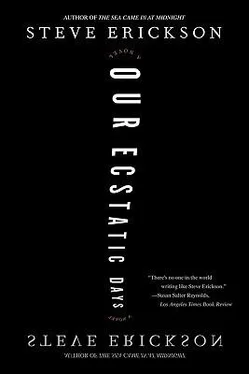Bronte in him maybe, as if she was the shadow of his resurrection, or maybe
mean something to someone, or that they didn’t have a meaning no one knows.
And at that point, of course, well then what’s rational and what isn’t? At that point there’s no saying anymore what chaos is, there’s no saying anymore what “meaning” means. At that point. The broadcasts were meaningless, Wang said to Tapshaw, as though that was the rational explanation — which only means sometimes randomness is rational and meaning isn’t. Then you’re lost in the dark heart of god or the void, whichever you’ve decided you believe in: when there are no accidents, is chaos chaos anymore? And if everything is an accident, is order an accident as well? One man stands before a line of tanks. Another crashes an airliner into a building. One ends an Age of Reckoning, the Age of the Sky; the other begins the Age of Chaos, in which the sky melts to earth and becomes a lake. On one or the other or both, those who record the times and those who interpret or use the lessons of what’s recorded — and especially those who love power first and last and only, and use such interpretations to their own ends — will impose a rationale. But ultimately and interiorly, the reasons belong not to those who watch and record and interpret and use, but those who do.
Which isn’t to say that, because the man standing before the tanks and the man crashing the airliner each does so for his own secret reason, they’re the same. It’s not to say there’s no difference between them, or that good and evil aren’t real. To the contrary — thinking about this now, although he doesn’t know it Wang crosses a point of inexorability, on his journey to the center of his life’s enigma — it’s men’s secret reasons that best testify to good and evil, which are as real as love and hate, which in turn are the world’s only incontrovertible things,
he was the manifestation of hers, and I woke then or rather was awakened in a
empirically incalculable as they may be. In his self-loathing there’s part of this proposition even Wang won’t accept yet, even as he now, yes, intuits it: he won’t accept that because he may not have stood before a line of tanks solely for whatever reason the world believes, the act was no less noble, no less heroic. Sometimes an act means something unto itself. Sometimes it has a heroism unto its own. That boy who rowed him in the boat back and forth to the Chateau, well, Wang didn’t even know him; and he’s going to live only long enough to begin to intuit the way a child — above and beyond any other creature or thing — explodes all notions of meaning and rationale, chaos and god, because it’s one’s child who makes such things matter beyond one’s own self. And if Wang can’t really answer the question of why the boy in the boat matters to him, or even if boy matters to him, what does matter is that she had a boy, not my boy no; no not mine, not ours, but one perhaps who could have used a father anyway, if there had been a man around big enough to overcome his pain and pride: so this, Wang thinks, this is for lost sons, and Tapshaw will never understand that.
A sudden dusk descends.
In China they would have found me by now, he thinks to himself sitting at the table; and then, turning to the increasingly frayed ribbon of blue in the sky through his window, rationale fractures to its fundament — and he catches his breath, thunderstruck.
She never got the letters.
His jaw actually drops a bit. A hot wave of his own absurdity washes over him; a moan only he can hear rises from the pit of him. Never having remotely crossed his mind before, this sudden
wave of nausea by the bubble of him breaking the surface of my dream and
realization out of the, well, gray if not blue, now has a stunning clarity: she never got the letters (labial jewel, riverine rapture …); and suddenly he sees the last fourteen years for their grand error, the greatest hubris of which has been not simply how reactively and immediately he concluded she had spurned him, without even considering the possibility that chaos might have intervened to thwart his attempts to reach her, but that he then called this conclusion “rational.” The rational processes of mathematics aside, one chooses what it is he wishes to consider rational about his life; and now if Wang could simply find a way to begin breathing again, if he could simply find a way to loosen himself from the revelation that grips his chest at this moment, he might ask himself not only how it is that rationality minus chaos equals not rationality but chaos, but also why he chose to believe in her rejection of him rather than in the intercession of chance. He might ask himself how it is he could have not taken into account a lake that appeared in the center of a city, and that cast into such pandemonium the age before him and all its correspondences.
Then he might ask himself who he is. The Emperor of Elevators, he whispers. What? asks the man handcuffed on the other side of the room; but Wang takes no notice. He raises his hand to the sky as though, viewed through the prism of his palm, its rare blue might be located. Wang? the other voice says again from the floor a few feet away, what’s wrong with you? but holding his hand up to his eye, staring through, Wang is transfixed, and finds himself back fourteen, fifteen years ago in this same house, sitting in this same place at a table much like this one, pen and stationery spread out where, just a moment ago, there was a gun, the waters of the lake not yet having risen as high up the banks outside the window. Oh this is one of those spells, he tells himself very lucidly, one of those “lapses” that have been reported around the city lately,
reclaiming his place in my womb, and it wasn’t ong after that I came back to
that he’s dismissed out of hand as outbreaks of mass psychosis even as he himself experienced such a thing one night a year ago, after returning from the Chateau for what proved to be his final visit there. Possessing both “present” and “past” consciousness, now he’s back in the days of ’4, back before the crusades and his days as a dockhand at Port Justine, hurled back to this time by force of either trauma or triggered recollection, to this memory on which a life turned — several lives, as he’s about to learn. He feels it all again, his rage at her silence then and, beyond that, at her old infidelity that produced the son that was not his, and at the forsaken years between them, and at his simultaneous imprisonment by and exile from the polar events of great moment through which he lived without her so anonymously: and once again, as he was fourteen years ago, he’s paralyzed by, what? … my love for her? or my fear of it … and then a man who has from time to time meditated on the laws of impulse only to reject them does the second profoundly impulsive thing of his life, and the first since he was nineteen years old.
Having been cast by his Lapse back into this memory, now he breaks free of its destiny. He turns from his window to gaze at the small empty house around him, stares at the pen and stationery on the table, and takes in his one good hand the umpteenth furious unfinished letter that another Kristin would receive by accident if he ever sent it … and instead crumples it up; then he takes leave of his senses. He walks quickly from the house and breaks into a run, hurrying to a boat moored on the banks, gets in the boat and, binding his bad hand to one of the oars with his belt, begins to row, undaunted by the four or five miles he has to cross.
Other than the smattering of lights coming on in the Silverlake casinos to the northeast, he takes little note of the slightly altered
Читать дальше











